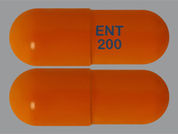Rozlytrek
Entrectinib
What is Rozlytrek used for?
This medication is used to treat various types of cancer. Entrectinib belongs to a class of drugs known as kinase inhibitors. It works by slowing or stopping the growth of cancer cells.
CHEMICAL NAME
DRUG TYPE
CancerRozlytrek Prices
Searching for the lowest prices
Rozlytrek Frequently Asked Questions
Nausea, vomiting, tiredness, constipation, dizziness, drowsiness, sleep problems, headache, diarrhea, muscle/joint pain, unusual changes in sense of touch, or changes in how food tastes may occur. If any of these effects last or get worse, tell your doctor or pharmacist promptly.
People using this medication may have serious side effects. However, you have been prescribed this drug because your doctor has judged that the benefit to you is greater than the risk of side effects. Careful monitoring by your doctor may decrease your risk.
Tell your doctor right away if you have any serious side effects, including: mental/mood changes (such as confusion, anxiety, depression, trouble paying attention, memory problems), numbness/tingling, vision changes (such as blurred/double vision, decreased vision), eyes being sensitive to light, signs of heart failure (such as shortness of breath, swelling ankles/feet, unusual/sudden weight gain), signs of liver problems (such as nausea/vomiting that doesn't stop, loss of appetite, stomach/abdominal pain, yellowing eyes/skin, dark urine).
Get medical help right away if you have any very serious side effects, including: fast/irregular heartbeat, severe dizziness, fainting.
This medication may increase your risk for bone fractures. Fractures may happen with or without a fall or injury. Tell your health care provider right away if you have bone pain or changes in movement.
This medication may cause your blood uric acid levels to increase. Your doctor will check uric acid levels regularly during treatment, and may adjust your dose of entrectinib. You may also be prescribed other medication to treat high uric acid levels.
This medication may lower your ability to fight infections. This may make you more likely to get a serious (rarely fatal) infection or make any infection you have worse. Tell your doctor right away if you have any signs of infection (such as sore throat that doesn't go away, fever, chills).
A very serious allergic reaction to this drug is rare. However, get medical help right away if you notice any symptoms of a serious allergic reaction, including: rash, itching/swelling (especially of the face/tongue/throat), severe dizziness, trouble breathing.
This is not a complete list of possible side effects. If you notice other effects not listed above, contact your doctor or pharmacist.
In the US -
Call your doctor for medical advice about side effects. You may report side effects to FDA at 1-800-FDA-1088 or at www.fda.gov/safety/medwatch-fda-safety-information-and-adverse-event-reporting-program.
In Canada - Call your doctor for medical advice about side effects. You may report side effects to Health Canada at 1-866-234-2345.
IMPORTANT: HOW TO USE THIS INFORMATION: This is a summary and does NOT have all possible information about this product. This information does not assure that this product is safe, effective, or appropriate for you. This information is not individual medical advice and does not substitute for the advice of your health care professional. Always ask your health care professional for complete information about this product and your specific health needs.
